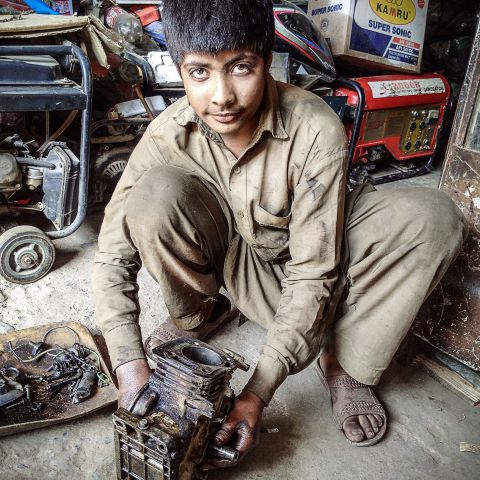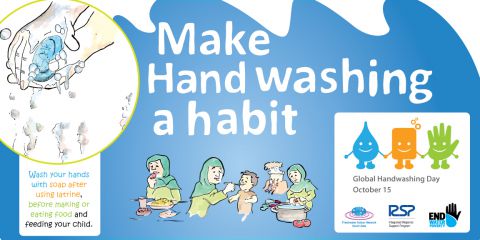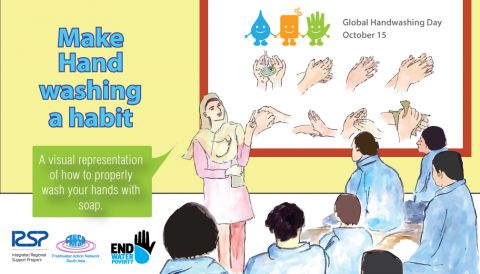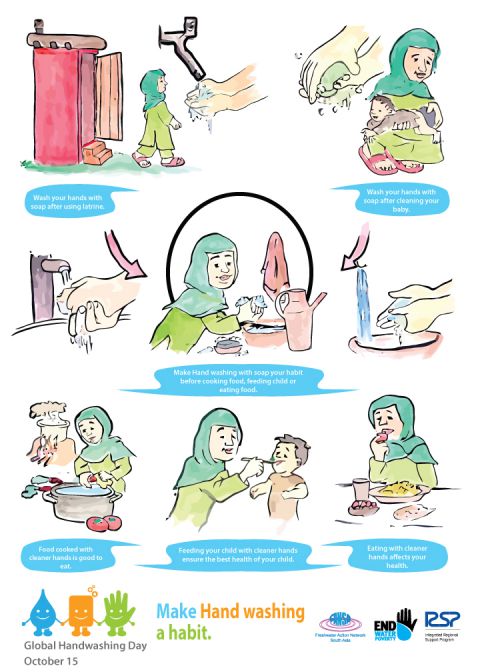Blog post written by Syed Shah Nasir, Executive Director of Integrated Regional Support Programme (IRSP) of Pakistan.
Sadly, like many other developing countries, Pakistan has a worryingly high number of children forced into the labour market to earn a daily livelihood from a very young age. A high percentage of these children provide support work in difficult sectors and jobs, such as in automotive garages and repair workshops. There children face a terrible reality as they are deprived of their essential rights to a clean and safe environment and access to basic services, including clean drinking water and basic hygiene. Too many are forced to work from dawn to dusk without adequate safety measures, and most are exposed to highly hazardous situations, causing very negative consequences. Some children have been diagnosed with chronic diseases resulting in poor health, or even hospitalisation.

Photo credit: Zia ur rahman IRSP/ IT
If they are able to attend school at all, most poor families in rural Pakistan are forced to enrol their children in government-run schools, which have poor water and sanitation facilities, due to the high numbers of children enrolled in these under-serviced schools. Children are often left to rely on a single toilet provided for the use of all children in the school, and usually there are no handwashing facilities available at all. In extreme cases, children are left with no other recourse than to urinate and defecate in the open. Children, such as those working in unsanitary environments like car repair workshops, or in poorly serviced schools, have very few opportunities to wash their hands with soap. This is due to a combination of a lack of awareness about the importance of handwashing, as well as not being provided with handwashing facilities. These situations have highly negative consequences due to the high numbers of diseases closely associated with poor hygiene.

To overcome this gigantic problem and improve the situation will require integrated and dynamic approaches, as well as dedicated time to properly address the full range of issues involved. It would also entail involving all stakeholders, from local informal media, local authorities, welfare groups, elected representatives and politicians to truly make a successful long term impact and ensure change happens. The Pakistan-based civil society organisation, Integrated Regional Support Programme (IRSP), together with technical guidance and support of End Water Poverty and the Freshwater Action Network – South Asia (FANSA), are planning a systematic approach to directly affect these challenges and help make a better future. Together, they are using Global Handwashing Day on 15 October as a key opportunity to directly target problematic employment sectors with high numbers of child workers, such as automobile repair workshops, along with primary schools, in order to target those who are most vulnerable and marginalised and call for change. They will also be prioritising girls’ schools under the theme of ‘Making handwashing a habit” and “clean hands save lives”, as girls face increased risk of disease and negative impacts due to a lack of access to hygiene facilities, particularly handwashing stations.

IRSP is joining the world wide movement on Global Handwashing Day to raise awareness about this fundamentally important habit, and help to change people’s behavior. Keeping in mind the importance of handwashing with soap, IRSP initiated the preparatory phase in the first week of October, designing the posters to be used for awareness and sensitisation workshops with children. IRSP is working with the support of district governments and other civil society organisations, to ensure a broader reach and impact. The upcoming joint activity will be highlighted through local and social media to create a bigger impact at the national and sub-national levels.
The ‘handwashing with soap’ campaign will prioritise three main activities: sensitisation and awareness-raising of the issue with target audiences and groups; holding a focus group discussion on the importance of handwashing with soap; and holding practical public demonstrations with over two thousand people to highlight the importance of properly handwashing with soap.
We will also engage district governments and other local authorities to push for a hygiene bill for working places/ stations to be presented before the district assembly to become an integral part of local legislation. The legislation defines minimum hygiene standards, which should include the installation of handwashing units and availability of soap in every working environment, including educational institutions. This would make a fundamental difference to people’s lives through access to better hygiene and sanitation services.

Join us as we celebrate Global Handwashing Day on 15 October! Together for a better future for all. Visit the campaign’s website for all resources for your advocacy around Global Handwashing Day.